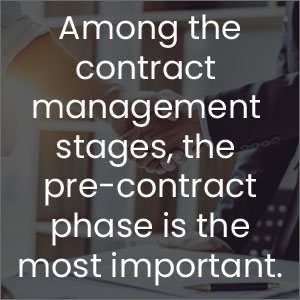Broadly speaking, contract management of legal agreements can be divided into three phases:
- Pre-contract phase
- Contract development & execution phase
- Post-award phase (often referred to as contract compliance/governance)
In this discussion, we will look at the first phase – being the pre-contract phase.
WHAT IS THE PRE-CONTRACT PHASE IN CONTRACT MANAGEMENT?
This first phase is that in which two parties have a desire to work together. There is a good reason, interest, and intent to do so. Bringing two parties together for an agreement provides a net benefit to both, be it for financial or strategic reasons.
As part of the contract management process before an agreement is drafted, it is important for the two companies or parties to understand the interaction, opportunity, and intent of a deal. At this early part of the discussion, there is an opportunity for the legal teams (general counsel, contracting team…) to fully understand the project and intent.
WHAT WORK IS COMPLETED IN THE PRE-CONTRACT PHASE?
Before any project work, information transfers, or financial transactions take place, you need to understand the project, scope, resources, and what each party’s obligations and responsibilities are. So, at this planning phase, the teams of experts and specialists get together to fully understand what is to be done, who does what, what the end result looks like, and the compensation for completion.
Typical considerations in the pre-contract phase include:
- Introductions & exchanging contact details
- Outline roles, responsibilities, and communication methods
- Highlight the major steps and stages in the project
- General pricing, cost or spend profile (where applicable)
- High-level objectives of the agreement
- Risk assessment (where applicable)Among the contract management stages, the pre-contract phase is the most important.
- Set meeting schedules as needed
- Bill Of Quantities (BOQ) | Bill Of Goods (BOG)
- Exchange needed documentation (insurance certificates, authorizations, bonds…)
- Review overview roles (project management, inspections…)
- A general outline of expectations, monitoring procedures, and timing
- Tacit agreement on best practices to follow
- Highlights of any critical issues (access to sites, transportation, equipment to be used, resources…)
- Statement Of Work (SOW)
- Service Level Agreements (SLA)
These myriads of details are important to help structure and detail the next phase of drafting an agreement document.
What is Digital Transformation?
WHY IS IT IMPORTANT?
Among the contract management stages, the pre-contract phase is arguably the most important. This is the phase at which a general idea starts to germinate. Here, the intent and concept of the work and relationship form. It structures the outline of why the two parties are coming together on a project. Also, there should be a general understanding of what each party ‘gets’ out of the relationship.
SUCCESS AT THE PRE-CONTRACT PHASE
A good job at the planning phase should help to avoid mistakes throughout the life of the agreement. As an example, research from the University of Arizona (2014) in the construction industry empirically points to a clear lesson: “Planning is known to enhance construction project performance in terms of cost, schedule, and quality. Yet, project teams oftentimes do not incorporate effective planning methodologies, typically citing a lack of time or capability to conduct detailed planning.”
Abstracting away from the construction industry, this is an interesting conclusion that applies to most other industries and certainly in the field of contractual agreements. Therefore, doing a good job at the pre-contract phase is very important. Detailed due diligence and thorough understanding of the agreement by both parties will mean the contracting and post-contract stage will be a faster and smoother process.
Best of all, a good job at the planning phase should help avoid misunderstandings and misconceptions throughout the life of the agreement.
For further information about various project management and business management considerations at the pre-contract phase, read Adrienne Watt’s Procurement Management chapter (part of BCCampus’s Project Management text).
NEXT STEPS
As a result, the pre-contract phase is only the starting point of developing a legal agreement between two parties. As general reminder, the most effective legal teams utilize a smart contract management software solution for maintaining their agreements. The next post in this series will discuss the ‘Contract Development, Award, and Execution’ phase of the contracting cycle which you can find below.
For further reading about the contracting cycle and process overall – download your copy of the Contract Management Primer. It provides readers with a high-level look at the full agreement creation cycle, including process management. Also, there is a handy contract lifecycle management (CLM) checklist. This helps anyone interested in improving their contracting processes dramatically with a full CLM as well as highlights key aspects that every good CLM should include.
Is Your Business Ready for CLM?
Author:

Manpreet Dhillon
Connect with us on Linkedin





